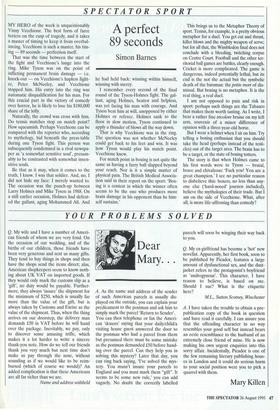SPECTATOR SPORT
A perfect 89 seconds
Simon Barnes
MY HERO of the week is unquestionably Vinny Vecchione. The best form of farce teeters on the cusp of tragedy, and it takes a master of timing to keep it from overbal- ancing. Vecchione is such a master, his tim- ing —89 seconds — perfection itself.
That was the time between the start of the fight and Vecchione's lunge into the ring. Mike Tyson was on the point of inflicting permanent brain damage — i.e. knock-out — on Vecchione's hapless fight- er, Peter McNeeley, and Vecchione stopped him. His entry into the ring was automatic disqualification for his man. For this crucial part in the victory of comedy over horror, he is likely to lose his $180,000 share of the lolly.
Naturally, the crowd was cross with him. Do tennis matches stop on match point? How squeamish. Perhaps Vecchione can be compared with the reporter who, according to mythology, hid beneath the press-table during one Tyson fight. This person was subsequently condemned in a rival newspa- per as 'a somewhat sensitive soul', presum- ably to be contrasted with somewhat insen- sitive souls.
Be that as it may, when it comes to the truth, I know. I was that soldier. And, no, I did not hide my face: I merely wanted to. The occasion was the punch-up between Larry Holmes and Mike Tyson in 1988. On a still earlier occasion, Holmes had defeat- ed the gallant, aging Mohammed Au. And he had held back: winning within himself, winning with mercy.
I remember every second of the final round of the Tyson-Holmes fight. The gal- lant, aging Holmes, beaten and helpless, was yet facing his man with courage. And Tyson beat him at will, unopposed by either Holmes or referee. Holmes sank to the floor in slow motion, Tyson continued to apply a thunder of blows all the way down.
That is why Vecchione was in the ring. The question was not whether McNeeley could get back to his feet and win. It was how Tyson would play his match point. Vecchione knew.
For match point in boxing is not quite the same as having a furry ball slapped beyond your reach. Nor is it a simple matter of physical pain. The British Medical Associa- tion said in their report on the sport: 'Box- ing is a contest in which the winner often seems to be the one who produces more brain damage in his opponent than he him- self sustains.' This brings us to the Metaphor Theory of sport. Tennis, for example, is a pretty obvious metaphor for a duel. You get cut and thrust, killer blows and the mighty weapon of serve; but for all that, the Wimbledon final does not conclude with a bleeding, twitching corpse on Centre Court. Football and the other ter- ritorial ball games are battles, clearly enough. Cricket is more complicated. The game is dangerous, indeed potentially lethal, but its end is the not the actual but the symbolic death of the batsman: the petite mort of dis- missal. But boxing is no metaphor. It is the real thing, a real duel.
I am not opposed to pain and risk in sport: perhaps such things are the Tabasco that makes them worth tasting. As I write, I bear a rather fine tricolore bruise on my left arm, souvenir of a minor difference of opinion with a three-year-old horse.
But I wear a helmet when I sit on him. Try telling a boxing enthusiast that you should take the head (perhaps instead of the testi- cles) out of the target area. The brain has to be a target, or the state of boxing totters.
The story is that when Holmes came to his first words were to Tyson — brutal, brave and chivalrous: 'Fuck you! You are a great champion.' I see no particular reason to disbelieve this: boxers, no less than any- one else ('hard-nosed' journos included), believe the mythologies of their trade. But I am on the side of Vecchione. What, after all, is more life-affirming than comedy?


















































 Previous page
Previous page